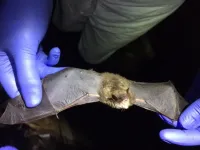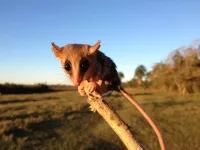Genetics study finds ancestral background can affect Alzheimer's disease risk
2021-02-04
(Press-News.org) Genetics contributes to the risk of developing Alzheimer's disease, and the APOE gene is the strongest genetic risk factor, specifically the APOE4 allele. However, it has been known for a while that the risk due to the APOE4 allele differs considerably across populations, with Europeans having a greater risk from the APOE4 allele than Africans and African Americans.
"If you inherited your APOE4 allele from your African ancestor, you have a lower risk for Alzheimer disease than if you inherited your APOE4 allele from your European ancestor," said Jeffery M. Vance, M.D., Ph.D., professor and founding chair of the Dr. John T. Macdonald Foundation Department of Human Genetics, professor of neurology, and director of the Center for Genomic Medicine at the John P. Hussman Institute for Human Genomics (HIHG).
Dr. Vance and his colleagues -- co-senior author Juan Young, Ph.D., an associate professor in the Department of Human Genetics and HIHG, and lead authors Anthony J. Griswold, Ph.D., research assistant professor of human genetics and associate director of the Center for Genome Technology, and Katrina Celis, M.D., postdoctoral fellow -- have led a new Miller School genetics study following up on this observation. They have found that among individuals with the same high-risk APOE4 allele, those with European local ancestry in the APOE region have a significantly higher expression of APOE in specific cell types in their brains than those with African ancestry, suggesting this contributes to the difference in risk.
The article, "Increased APOE4 Expression is Associated with the Difference in Alzheimer Disease Risk from Diverse Ancestral Backgrounds," was published February 1 in Alzheimer's & Dementia: The Journal of the Alzheimer's Association.
The Miller School study involved RNA sequencing of more than 60,000 individual cell nuclei taken from the brain tissues of Alzheimer's patients carrying the APOE4 with African or European local ancestry.
"The brain is an organ made up of many different cell types. To properly understand the effects of changes in gene expression you should look at each cell independently, rather than as a mixture," Dr. Griswold said. "In this study we used single cell processing and sequencing to look at brains of African and European APOE4 carriers at a higher resolution than had been done previously."
Dr. Griswold noted that the APOE gene was expressed significantly higher in the brains of the people with European ancestry. In addition, European ancestry individuals had high numbers of a cell type resembling reactive astrocytes, brain cells that are formed under stress and are toxic to neurons. "This suggests a possible linkage of APOE4 with inflammation response, which is another risk factor for AD," he said, adding that those astrocytes were not observed in any of the African ancestry individuals.
"The data from our study suggests that finding a way to block the increased expression of the APOE4 allele could have potential therapeutic benefits," said Dr. Vance. "It also supports the importance of knowing the ancestral origin of the APOE4 allele when predicting the risk of AD for any individual carrying the APOE4 allele."
INFORMATION:
Other Miller School co-authors of the study were Margaret A. Pericak-Vance, Ph.D., director of the HIHG and Dr. John T Macdonald Foundation Professor of Human Genetics; Parker Bussies, M.D., M.S., research fellow; Farid Rajabli, Ph.D., assistant scientist; Patrice Whitehead, director of the HIHG biorepository; Kara Hamilton-Nelson, analytic project manager; Gary W. Beecham, Ph.D., associate professor and director of research informatics; Derek M. Dykxhoorn, Ph.D., research associate professor; Karen Nuytemans, Ph.D., research assistant professor; Liyong Wang, Ph.D., research associate professor; Olivia K. Gardner, M.D./Ph.D. student; Daniel Dorfsman, graduate student; and William K. Scott, Ph.D., professor in the Department of Human Genetics and HIHG.
ELSE PRESS RELEASES FROM THIS DATE:
2021-02-04
ATLANTA - FEBRUARY 4, 2021 - Cancer ranks as a leading cause of death in every country in the world, and, for the first time, female breast cancer is the most commonly diagnosed cancer, overtaking lung cancer, according to a collaborative report, Global Cancer Statistics 2020, from the American Cancer Society (ACS) and the International Agency for Research on Cancer (IARC). Data show that 1 in 5 men and women worldwide develop cancer during their lifetime, and 1 in 8 men and 1 in 11 women die from the disease.
The article describes cancer incidence and mortality at the global level and according to sex, geography, ...
2021-02-04
Niigata, Japan - Researchers from the Graduate School of Science and Technology at Niigata University, Japan along with their collaborators from Tokyo University of Science (Japan), Yamagata University (Japan) and University of Regensburg (Germany) have published a scientific article which enhances clarity on the understanding of proton conduction mechanism in protic ionic liquids. The findings which were recently published in The Journal of Physical Chemistry B sheds light on the transport of hydrogen ions in these liquids, which opens new avenues for the development of novel energy generation and storage devices.
With ...
2021-02-04
Scientists have found genetic differences between bats killed by white-nose syndrome and bats that survived, suggesting that survivors rapidly evolve to resist the fungal disease, according to a Rutgers-led study with big implications for deciding how to safeguard bat populations.
White-nose syndrome has killed millions of bats in North America since 2006, following its introduction from Europe. The syndrome, caused by the fungal pathogen Pseudogymnoascus destructans, is arguably the most catastrophic wildlife disease in history. It has led to unprecedented declines in many North American bat species, including the little brown bat (Myotis lucifugus).
"Our finding that little brown bat populations have evolved, which could be why they survived, has large implications for ...
2021-02-04
Lots of us are feeling pretty anxious about the destruction of the natural world. It turns out, humans aren't the only ones stressing out--by analyzing hormones that accumulate in fur, researchers found that rodents and marsupials living in smaller patches of South America's Atlantic Forest are under more stress than ones living in more intact forests.
"We suspected that organisms in deforested areas would show higher levels of stress than animals in more pristine forests, and we found evidence that that's true," says Noé de la Sancha, a research associate at the Field Museum in Chicago, Associate Professor of Biology at Chicago State University, ...
2021-02-04
New research published today in the journal Scientific Reports based on the largest-to-date analysis of commercial data on egg-laying hen mortality finds that mortality in higher-welfare cage-free housing systems decreases over time as management experience increases and knowledge accrues.
This finding marks a major turning point in the debate over the transition in housing systems for egg-laying hens from battery cages to indoor cage-free systems, which some egg producers have argued would increase hens' mortality even as it allowed birds to stretch their wings.
The study, authored by Dr. Cynthia Schuck-Paim and others, included data from 16 countries, 6,040 commercial flocks, and 176 million hens in a variety of caged and ...
2021-02-04
DALLAS, Feb. 4, 2021 -- Stroke and heart attack survivors can reduce multiple causes of death and prevent further cardiovascular events by drinking green tea, according to new research published today in Stroke, a journal of the American Stroke Association, a division of the American Heart Association. The study also found daily coffee consumption helps heart attack survivors by lowering their risk of death after a heart attack and can prevent heart attacks or strokes in healthy individuals.
Previous research has examined the benefits of green tea and coffee on heart health in people without a history of cardiovascular disease or cancer. Researchers in ...
2021-02-04
BOSTON - Medical histories of patients collected and stored in electronic health records (EHR) can be rapidly leveraged to predict the probability of death from COVID-19, information that could prove valuable in managing limited therapeutic and preventive resources to combat the devastating virus, researchers from Massachusetts General Hospital (MGH) have found. In a study published in npj Digital Medicine, the team described how artificial intelligence (AI) technology enabled it to identify factors such as age, history of pneumonia, gender, race and comorbidities like diabetes and cancer as predictors of poor outcomes in COVID-19 patients.
"By combining computational methods and clinical expertise, we developed a set of models to forecast ...
2021-02-04
The open ocean is a harsh place for newborn fishes. From the minute larvae hatch from their eggs, their survival depends upon finding food and navigating ocean currents to their adult habitats--all while avoiding predators. This harrowing journey from egg to home has long been a mystery, until now.
An international team including scientists from the Arizona State University Center for Global Discovery and Conservation Science (GDCS), NOAA's Pacific Islands Fisheries Science Center, and the University of Hawai'i at Mānoa have discovered a diverse array of young marine animals finding refuge within so-called 'surface slicks' in Hawai'i. Surface slicks create a superhighway of nursery habitat for more than 100 species of commercially and ecologically ...
2021-02-04
To survive the open ocean, tiny fish larvae, freshly hatched from eggs, must find food, avoid predators, and navigate ocean currents to their adult habitats. But what the larvae of most marine species experience during these great ocean odysseys has long been a mystery, until now.
A team of scientists from NOAA's Pacific Islands Fisheries Science Center, the University of Hawai'i (UH) at Mānoa, Arizona State University and elsewhere have discovered that a diverse array of marine animals find refuge in so-called 'surface slicks' in Hawai'i. These ocean features ...
2021-02-04
The Institute for Scientific Information on Coffee (ISIC) published a new report today, titled 'Coffee and sleep in everyday lives', authored by Professor Renata Riha, from the Department of Sleep Medicine at the University of Edinburgh. It reviews the latest research into coffee's effect on sleep and suggests that while drinking coffee early in the day can help support alertness and concentration levels1, especially when sleep patterns are disturbed; decreasing intake six hours before bedtime may help reduce its impact on sleep2.
Coffee is largely consumed daily for the pleasure of its taste3, as well as its beneficial effect on wakefulness and concentration (due to its caffeine content)4. ...
LAST 30 PRESS RELEASES:
[Press-News.org] Genetics study finds ancestral background can affect Alzheimer's disease risk




